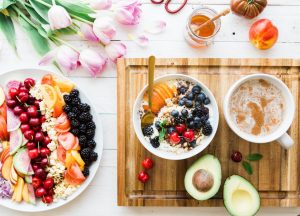 You must understand that proper nutrition is not a diet! Unlike proper nutrition, all diets are short-lived. But proper nutrition throughout life is simply necessary! It will deprive colds, sores, problem skin, and extra pounds. A well-chosen food system will help to cope with all these problems. Not everyone can persuade themselves to give up fat, hot dogs, and burgers.
You must understand that proper nutrition is not a diet! Unlike proper nutrition, all diets are short-lived. But proper nutrition throughout life is simply necessary! It will deprive colds, sores, problem skin, and extra pounds. A well-chosen food system will help to cope with all these problems. Not everyone can persuade themselves to give up fat, hot dogs, and burgers.
As with diet, in proper nutrition, there are rules and prohibitions. And although there are not so many of them, you will still have to curb your gastronomic desires and adapt to a certain diet. The most difficult in the first weeks is when you time in the store or restaurant will need to remind yourself of new principles of life and limit yourself.
It is important to note that for every person who has any chronic diseases or is constantly ill, see a doctor when drawing up a new “diet” – a must.
Principles of proper nutrition
1. Frequency
One of the main rules of proper nutrition – is to eat several times a day – preferably at least 3-5 times, but in small proportions and at the same time.
2. Diversity
Nutrition should be varied and not too extravagant. You should not become a maniac who is trying to feed himself some spinach or cauliflower, which you have had since childhood. But still can not do without “pain”. The amount of fatty, fried, spicy, and sour foods will have to be limited. The human body needs a huge amount of organic and mineral substances to function properly, and they must be present in your diet.
3. Graduality
It is difficult to give up the usual food at once, so include “healthy” foods in your diet gradually. Buy yourself a food steamer, it will retain all the nutrients contained in the products, and at the same time protect you from fats.
4. Energy balance
Food must make up for our energy losses and your food system must take this into account.
5. Breakfast is mandatory
Breakfast should be complete and varied – coffee with a bun with cheese is not enough. The best option is to choose oatmeal or buckwheat, what to taste. If you do not have time in the morning to cook, you can eat an apple, banana, or yogurt. It is good to eat an egg and instead of coffee drink a cup of freshly brewed tea, preferably green and of course without sugar.
6. Eat on schedule
You can take to work a loaf of bread, a muesli bar, a mixture of dried fruits with nuts, an apple, or a piece of cheese. All this will help to hold out until dinner in a good mood.
7. Dilute the diet
During lunch and dinner, do not forget about thick soups. They promote better digestion and do not overload the stomach. The amount of alcohol should be reduced. Drink juice, tea, or mineral water without gas. But forget about carbonated water, because this water hurts the gastrointestinal tract.
8. Sweet
Lovers of sweets are advised not to abuse cakes and pastries with cream, or lots of chocolate. Useful, for example, fresh cheese with fruit or berries, marmalade, and honey. Desserts, by the way, contrary to popular belief, it is better to eat before the main meal – it will help reduce appetite and prevent overeating. Fruits eaten at the end of a busy lunch or dinner are digested for too long and lose all nutrients. It is better to treat yourself to an apple, orange, or banana between meals or just before a meal.
9. Don’t forget about genes
When choosing products, try to delve into the genealogy of your family. For example, if your ancestors are from the North, then fish and meat dishes are welcome in your food system, but exotic fruits are not the best choice for you. It is possible that the genes have not yet “got used” to this type of food, which, however, does not prevent you from making a small experiment.
10. Fruits and vegetables
This is one of the basics of proper nutrition. They must be present in your diet. They contain much-needed dietary fiber and vitamins. Lack of fruit in the diet can cause thirst (having to drink a lot, which increases the load on the heart and kidneys) and the need to take vitamins, which are significantly different from natural counterparts. But you should not eat only fruits and salads all day, because it leads to stomach upset and other problems associated with the digestive process. After all, the protein in vegetables is not enough.
Picture Credit: Unsplash
